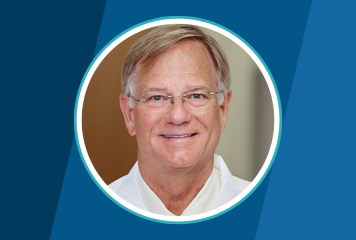Why did you want to become a physician?
I wanted to become a physician because I was fascinated by biological processes. After briefly considering a career in ecology, the chance to serve humanity was an inescapable force.
What’s the best advice you’ve received as a doctor?
The best advice someone ever gave me about being a doctor was to “listen to your patients and they will tell you what’s wrong with them” – a quote from Sir William Osler – relayed to me by Dr. Herb Fred.
What’s been the proudest moment of your career?
One of the proudest moments in my career so far was launching the American College of Rheumatology Clinical Registry in 2008.
 When you talk to others about the work you do, what story do you like to tell?
When you talk to others about the work you do, what story do you like to tell?
I was the supervising attending physician at Lyndon B. Johnson Hospital Emergency Room in Houston, Texas, in the 1990s. It was an unusually cold night for Houston. A homeless man came to the emergency room with generalized malaise. The nursing staff was aghast at his condition and seemed to avoid him; they seated him in one corner of the waiting room and were even reluctant to take vital signs. I stepped in and took him back to the decontamination room where I proceeded to shower him down, clean him up and put him in a fresh hospital gown. I listened to his story about how he became homeless and what his current situation was. He was simply hungry, cold and tired. We then examined him, fed him and admitted him overnight. The next morning, the social worker met with him, gave him a set of clean clothes and arranged transfer to a shelter.
I was reminded of this story by a colleague 10 years later because the colleague was moved by my empathy and action. It reminded me that sometimes, all that’s required of being a leader is to lead by example by serving.
What is one of the biggest misconceptions about doctors?
A big misconception about doctors is that their knowledge is infallible.
Why do you serve on ABIM governance?
In my opinion, rheumatologists are unsung heroes taking care of patients with a variety of chronic diseases. They are increasingly taxed with a growing population of patients with rheumatic disorders, and their voice is often not heard by large organizations. One of my goals in ABIM governance is to help bring the voice of the community rheumatologist to ABIM in order to support my colleagues.
How would you describe your experience of joining and serving on the ABIM Rheumatology Board?
Before I joined the ABIM Rheumatology Board, I didn’t know that ABIM has a highly qualified scientific staff. After joining, I learned that the process of designing tests and validating scores is robust and rigorous. I have met an array of professionals who are remarkably talented and dedicated.
What is the best thing about serving?
The best thing about serving is knowing that I have the opportunity to impact society by ensuring that physicians deliver high-quality, contemporary care. I would encourage others to join ABIM governance, because the view from within is remarkably different from that which is narrated from the outside.
What is something your colleagues may not know about you?
I’m a huge Bob Dylan fan and have heard every song that he wrote. Growing up in Pakistan, a relatively conservative society with considerable deference to authority, it was refreshing to hear the songs of Bob Dylan, which helped me recognize the inequities in societies everywhere. Songs like “The Times They Are a-Changin’” and “Masters of War” helped me understand the human condition and were a driving force in my decision to pursue a career in medicine, to help others and make an impact on society. I believe you can serve humanity from anywhere in the world.
What are your personal interests?
Aside from medicine, I am also interested in organizational psychology and philosophy.



